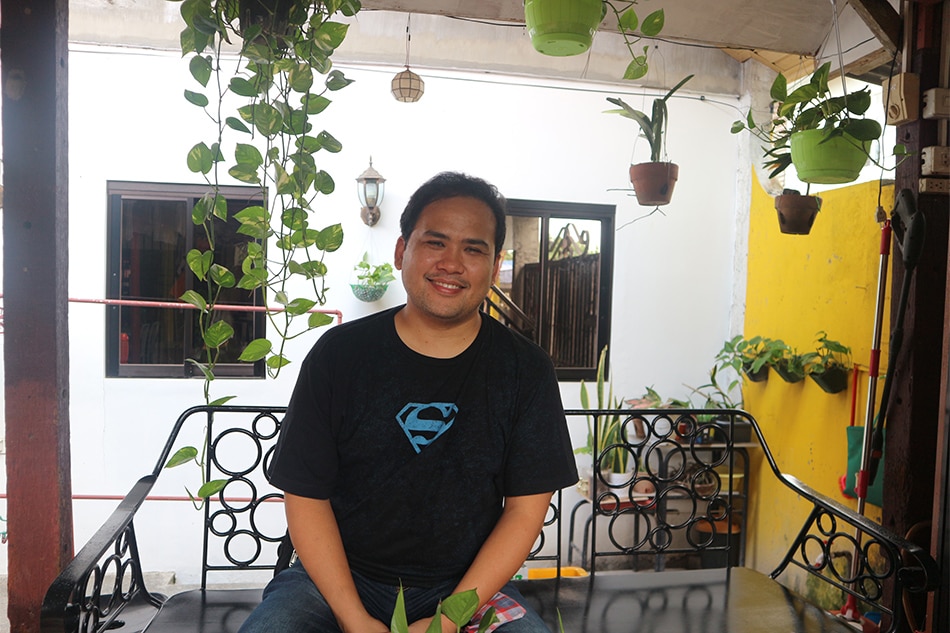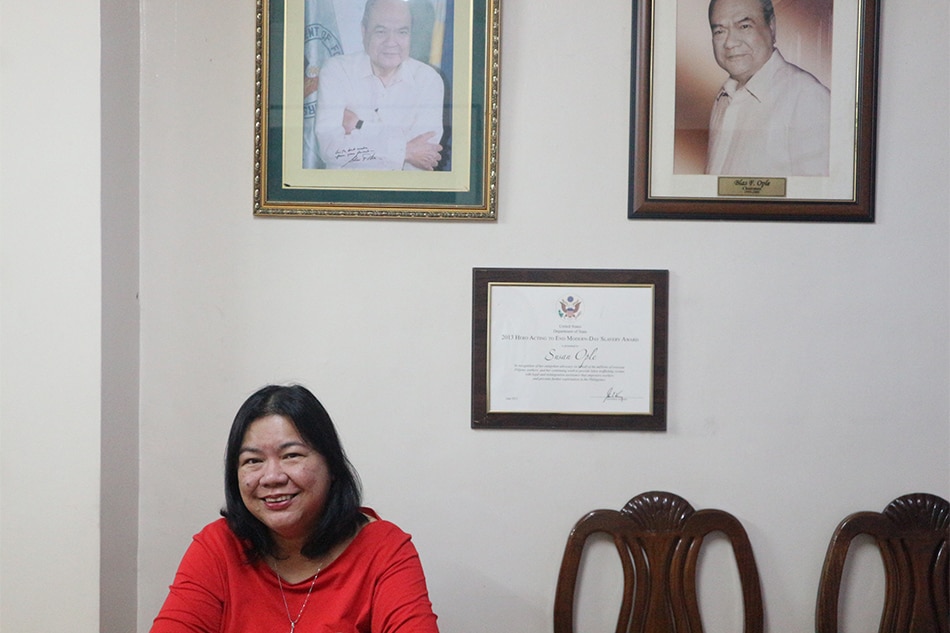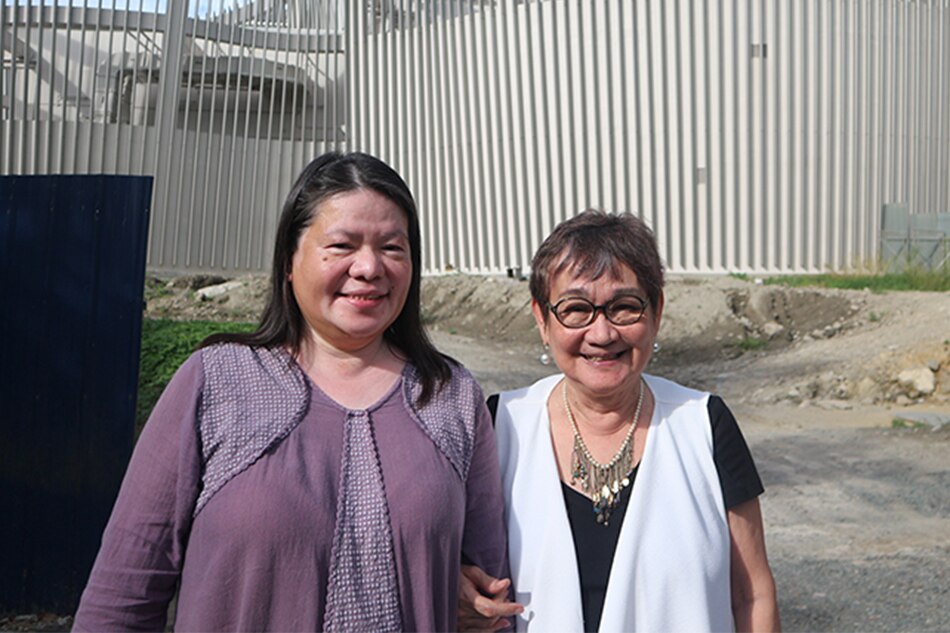Househusbands on the rise as more Pinays work abroad
Jamaine Punzalan, ABS-CBN News
MANILA -- Randy Granada, whose wife works abroad, often consults books and the internet as he raises their 2 teenage sons, joining a growing number of fathers who took over the management of their household amid a steady demand for female overseas workers.
Granada himself was an undocumented OFW for 9 years, during which he was not able to visit his family even once. His sons were toddlers when he left in 2003 for London, where he worked as dishwasher and porter in various hotels, and later as a security guard in remote construction sites.
When the UK raised fines against undocumented workers in 2008, Granada spent the next 4 years getting odd jobs with the help of female OFWs.
"Para bang nakiki-extra ka lang sa mga Pilipina na sinuwerte, nagkaroon ng trabaho. Karamihan doon, mga babae ang may trabaho kasi silang kailangan sa bahay," said the 43-year-old Granada.
(It's like you were just a reliever of the Filipinas who became lucky and got jobs. Majority of those who had jobs were women because they were needed in homes.)
Granada finally went back to the Philippines in 2012 with the help of a charity organization, but one of his sons did not recognize him after years apart, he said.
"Sa airport, nakatingin lang sa 'kin. Parang ang layo ng loob," he said. "Ilang buwan ang lumipas, laging nag-uusap, naging okay, nakabawi."
(He was just looking at me at the airport. It was as if he had no affection for me. After a few months, with constant communication, it became okay, I made up for the lost time.)
Two years later, however, his family's multi-vitamin business floundered, prompting his wife to work as a supermarket manager in Singapore -- a job that allows her to come home at least thrice a
year.
year.
Granada, meanwhile, runs an online dropshipping business from their home in San Pablo, Laguna, where his mother helps him with house chores. He said the most difficult part of being a stay-at-home dad is disciplining his children, especially when his wife cannot give him advice.
"Noon namang nakasama niya iyung mga bata, maliliit pa. Iba na iyung stage ng mga bata," he said of his sons, one of whom is in high school while the other is an incoming engineering freshman.
(The kids were still young when she was with them. The children are now at a different stage.)
'BULLETPROOF' DEMAND FOR PINAYS
In 2000, 53.9 percent of 978,000 OFWs were men, according to the Philippine Statistics Office.
But last year, women outnumbered the men working abroad, comprising 55.8 percent of the total 2.3 million OFWs, said the agency.
"Employment of women in household service, nursing and waiting/bartending is now largely more prominent than manual or skilled industrial work," according to a 2012 report by the Senate Economic Planning Office.
"This is a major shift away from the 1970s when mostly agricultural workers were sent to Hawaii and construction-related professionals were deployed to oil-rich Middle East countries," it added.
Arab countries in recent years prioritized hiring their own nationals and imposed taxes on the dependents of migrant workers, noted OFW advocate Susan Ople.
Meanwhile, demand for domestic workers remained "bulletproof" even when the global economy slumped because this forced foreign women to get jobs, leaving their children in need of carers, she said.
"Hindi naman iyan katulad dito na puwede mong ipakiusap sa in-laws o sa lola," Ople told ABS-CBN News.
(It's not like here where you can ask in-laws or the grandmother to take care of kids.)
SOCIAL COSTS OF MIGRATION
Men left to take care of their children, however, often suffer "pervasive sadness and deflated self-esteem", said clinical psychologist Dr. Lourdes Carandang, who researched on the feminized migration for the last 15 years.
"Hindi nila alam ang gagawin. They felt bad because parang iyung ego nila, hindi kami dapat ang andito," said Carandang, who authored the book "Nawala ang Ilaw ng Tahanan."
(They do not know what to do. They felt bad because their ego tells them, 'we should not be the ones left here.')
Carandang and the state-run Clark International Airport Corporation in 2013 spearheaded a psychosocial intervention program for fathers in Pampanga province whose wives work abroad.
The program Ama na Magaling Mag-aruga sa Anak (AMMA) first focused on helping househusbands value their role through months of counseling. At one point, they were asked to list the monetary value of all their chores, which amounted to P37,000, said Dr. Marie-Tessibeth Cordova, Clark Airport's community relations department manager.
AMMA beneficiaries, she said, were trained next on communicating with their children and running their household.
They recently ventured into hog raising and a food business with capital from the Overseas Workers Welfare Administration. AMMA members also give lectures now to help other househusbands, Cordova said.
"Noong na-transform sila, sabi nila ang haligi [ng tahanan] ay naging ilaw na rin. They were able to feel good about being parents, doing the mother role," said Carandang.
Backed by Transportation Secretary Arthur Tugade, plans are in place to replicate AMMA in other parts of the country, added Corodova.
AID FOR OFW FAMILIES
Ople called on the government to create a registry of the family of OFWs, which will allow social workers to check on them.
She also noted that it only takes 3 years before OFWs are estranged from their families so the government should help them set goals on how long they would work abroad and what they how could earn after returning home.
Ople Center heads a reintegration program where OFWs can get jobs at Reyes Haircutters salons after a 2-month training. It is also in talks with the Junior Chamber International to take on interns. Another non-government organization, the Villar Foundation, hires those it trained in masonry, she said.
"Kung halos iyung buong makinarya ng gobyerno available doon sa mga papaalis, sana ganoon din sa mga papabalik," Ople said.
(If almost the entire government machinery is available to those leaving, this should also be the case for those who are returning.)
"It's also a challenge for us na pagandahin na natin iyung ekonomiya natin. Laging umaangal iyung employers na wala na raw silang makita dito na qualified kasi nag-a-abroad, pero kasi naman, tatawid ka lang ng dagat, triple ang suweldo mo," she added.
(It's also a challenge for us to improve our economy. Employers always complain that they can't find qualified workers here because they're going abroad, but that's because you just cross the sea and you'll earn triple.)
Cordova, meanwhile, said a proposed P2,000 monthly aid for stay-at-home parents "would be a significant, substantive gesture ng (of the) government, community to say that what you're doing is important."
RE-FRAMING SOCIETY
To raise the value society gives to homemakers, Carandang also encouraged parents to refrain from giving house chores only to their daughters.
"We were the ones who reared these children to be macho in a way, not responsible for household chores. It's always the older sister who knows how to do household chores," she said.
Attitudes towards parenting, she said, are already changing, as shown by fathers in their 30s to 40s who proudly do chores and carry their children in public places.
"There's a lot of hope for the younger generation... In fact, the new fathers, are proud of their ability to parent," she said.
Among them is Granada, who said he shrugs off hurtful comments from those who believe that fathers should not stay home to take care of their children.
"Aanhin ko pa iyung ego saka iyung pride? Hindi ko naman mapapakain sa pamilya ko iyun... Alam naman nila na ginagawa ko iyung lahat para mapabuti iyung buhay namin," he said.
(What will I do with ego and pride? I can't feed that to my family. Besides, they know that I'm doing everything to improve our life.)



Comments